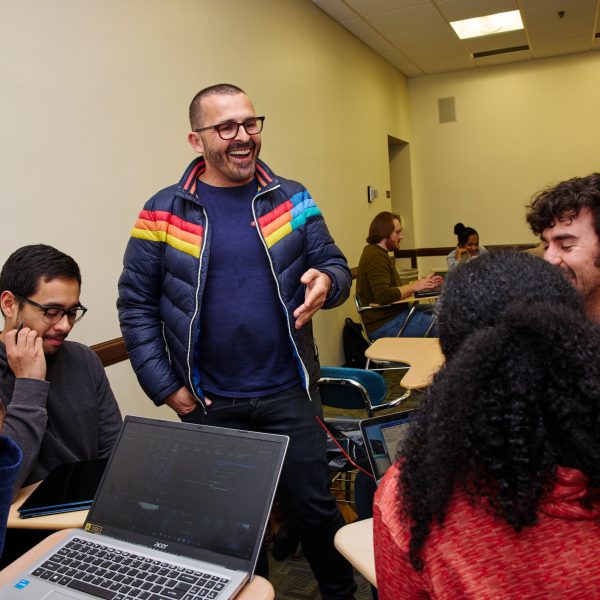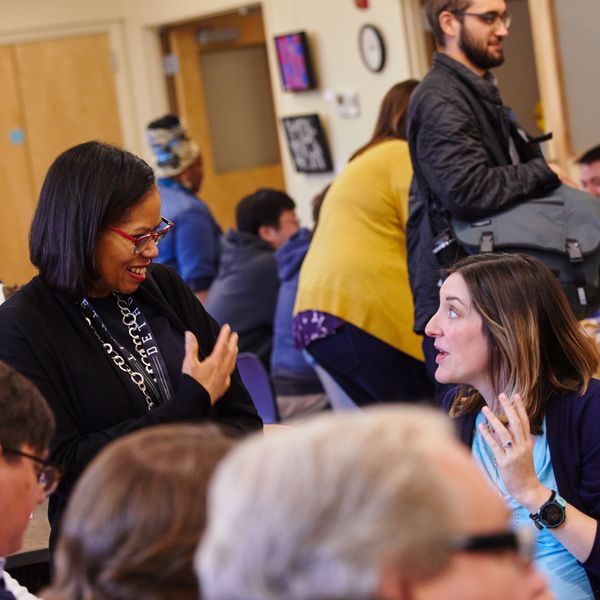Clinical Pastoral Education (CPE) might be a good fit as a Contextual Education experience for the student who wants to:
- Pursue Chaplaincy as a potential field of employment
- Develop their pastoral care skills
- Offer religious leadership in a non-religious institutional setting
- And/or offer religious leadership in a religiously pluralistic setting
Completing a unit of CPE may also be an ordination requirement in some students’ faith traditions.
What is CPE?
Clinical Pastoral Education (CPE) is a full- or part-time internship in a local hospital, prison, social service agency, or other non-religious institutional setting approved by the Association for Clinical Pastoral Education (ACPE). There are many CPE sites are located across the country, including several in the Boston area.
Students can pursue CPE either as a part-time internship spanning the entire length of the school year (both spring and fall semesters), or as a full-time internship during the summer months. In either case, the student must apply for CPE directly with the site they are hoping to pursue. Boston University School of Theology does not have its own CPE program, but does allow students to complete CPE through an ACPE accredited institution and receive credit towards their degree program.
Students who complete one unit of CPE can transfer this unit into their degree program for six units toward their master’s degree (MTS, MDiv, or MARPL).
How do I pursue CPE as my Contextual Education experience?
- Meet with the Contextual Education Office to talk through all of your Contextual Education options and determine whether CPE is the right fit for your degree program and vocational trajectory.
- Go to the ACPE website and search for an accredited institutional site that fits your interests. You may also want to utilize this helpful guide from the Chaplaincy Innovation Lab that outlines details of interest when choosing and applying to CPE sites, as well as a database of potential sites.
- Choose a couple of CPE programs and apply to them directly, heeding their institutional application deadlines.
- Once you have received an admissions offer to a CPE program, you will complete the ConEd Office’s Placement/Project Request Form, listing CPE as your chosen Contextual Education experience. Your form will be reviewed and approved by the Contextual Education Office staff.
- The student completes their CPE program, which will include on-site internship working hours, small group reflection gatherings with other students in the CPE program, case study assignment papers, readings, and weekly one-on-one supervision with your CPE program director. Because CPE programs include all of these components, students who complete CPE units do not have to add the School of Theology’s Integrating Theology and Practice (ITP) course to their schedule in the semesters they are pursuing CPE.
- Once a student successfully completes their CPE unit and has received their certificate of completion, they send a scan of this document to the School of Theology’s Registrar’s Office (sthregfa@bu.edu), copying the Contextual Education Office (sthope@bu.edu). The Registrar’s Office will authenticate the certificate and transfer your CPE unit in for six units toward your MDiv, MTS, or MARPL degree’s Contextual Education requirements.
What if I want to pursue a CPE site that is not ACPE accredited?
Many denominational ordination boards only accept CPE units that are completed in ACPE-accredited programs. So, if you are pursuing CPE as part of an ordination requirement, you will first need to determine if a non-ACPE-accredited site would be acceptable in fulfillment of your ordination requirements. If so, you would then need to receive special permission from the Contextual Education Office to pursue a non-ACPE site.
To request this permission, you would complete the Placement/Project Request Form to request your chosen CPE site as your Contextual Education experience. On that form, please outline your site’s information, including the fact that its program is not ACPE-accredited. If the site program holds a different accreditation, please list it on the form. The ConEd Office staff will receive your form and review the site’s credentials. If acceptable, they will approve the site. Otherwise, the student will be asked to pursue a different site for their Clinical Pastoral Education, if they want the unit to transfer in to the School of Theology in fulfillment of Contextual Education requirements.
What does CPE cost?
CPE is a separate educational program arising from within off-campus institutions unaffiliated with Boston University. You will have to pay tuition to the CPE program itself to pursue this option. While costs vary from site to site, most CPE programs cost around $2500 per unit. You are paying for the site supervisor’s time, as well as the institution’s willingness to allow you to practice your chaplaincy and/or pastoral care leadership skills therein.
Students using CPE to fulfill their Contextual Education requirements may be eligible for a $1,000 per semester scholarship from the School of Theology to help offset costs associated with their program. To be eligible for this additional scholarship, the student must not have received a Contextual Education scholarship previously and their CPE must be transferred in as their Contextual Education requirement, not as a free elective. For questions about whether you would be eligible for this additional scholarship, please speak with the Financial Aid Office (sthregfa@bu.edu).
Chaplaincy Student Group
The School of Theology has a student-led group that provides a space for students to discern their call to chaplaincy, navigate the School of Theology MDiv Chaplaincy track, and learn about additional opportunities related to chaplaincy in and around Boston. For more information, please contact the STH Student Association at STHSA@bu.edu who will put you in touch with the group’s leader.



